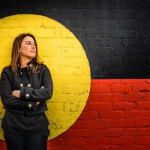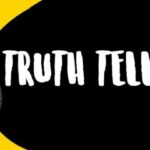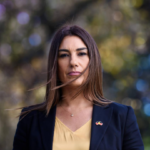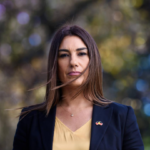“The Weakest Proposal for the Advancement of Aboriginal People”: Michael Mansell on the Voice
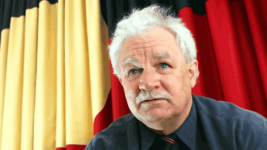
According to the PM, the Voice to Parliament referendum is set to be put to the Australian constituency in the second half of next year. And the results of a poll released this week, show that 50 percent of the population is in favour of it, while 26 percent oppose its creation.
But as much of civil society races to embrace the proposal that’s being spruiked as a means to advance First Nations rights and circumstance, many grassroots Aboriginal political commentators oppose the Voice, considering it a glorified version of constitutional recognition.
The crux of the argument against it posits that enshrining an Aboriginal and Torres Strait Islander advisory body in the Australian Constitution, will relegate First Peoples to a subordinate position of requesting that policies be made in a certain way, rather than determining their own future.
And well known Palawa advocate for Aboriginal advancement Michael Mansell is one of those opposing the Voice, as he considers it won’t have the positive effect for his people that’s being conveyed and instead a set allocation of Senate seats for Aboriginal people would forge change.
A distraction from treaty
The Howard government saw Australia vote, in 2007, as one of only four nations opposed to the adoption of the UN Declaration on the Rights of Indigenous Peoples, which upholds the human rights of First Peoples. And it was then PM John Howard who also flagged constitutional recognition.
In 2012, the Gillard government picked up the proposal to incorporate First Nations people into the nation’s founding document. And a series of 2016/17 conferences held with Indigenous delegates nationwide, ended with the Referendum Council promoting the alternate Voice to Parliament.
But while the Voice is supposed to be more robust in its impact, Anthony Albanese laid bare during his Garma speech in July, that those in the broader community who feel threatened by the proposal shouldn’t, as the body will ultimately have no veto power.
The favoured option of grassroots Aboriginal political advocates is that the Australian government enter into a treaty-making process with First Nations, which serves to acknowledge two sovereign entities and provide land and water rights.
Designated Senate seats
Mansell is the national secretary of the Aboriginal Provisional Government (APG), which is a body that was established in the early 1990s on the principle of Aboriginal sovereignty and that has since been campaigning for Aboriginal self-determination and self-government.
Also the chair of the Aboriginal Land Council of Tasmania, Mansell has long challenged the official assimilationist policies of successive governments, whilst maintaining that Aboriginal and Torres Strait Islander people have the right to decide on their own future without colonial interference.
Sydney Criminal Lawyers spoke to lawyer Michael Mansell about how the proposal to allocate Aboriginal seats in parliament would work, why the government favours constitutional recognition over treaty, and how he considers there’s no guarantee the Voice referendum will proceed.
Right now, the Albanese government is in the process of putting together the framework to hold a referendum, which will put to the nation whether an Indigenous voice to parliament that’s enshrined in the Australian Constitution should be established.
Mr Mansell, you’ve spoken out against the proposal to create an Aboriginal and Torres Strait Islander body that will advise parliament on Indigenous affairs.
Why do you oppose it?
It is the weakest proposal for the advancement of Aboriginal people that anyone could come up with.
In addition to that, Albanese has said that if there is a referendum held during this term of office, he will not also sign off on a treaty.
This means we’ve got a choice to have a treaty during this term of office or the Voice.
The difference between the two options is a voice delivers nothing but advice or comment any time that the parliament makes a law that might affect Aboriginal people.
On the other hand, a treaty delivers land, empowerment and a financial base. It gives us self-determination for closing the gap, and a whole range of other practical benefits.
So, why on Earth would anyone other than an elitist group support an advisory body over a treaty.
Prior to the May 2017 National Referendum Council meeting, there had been a long-term campaign to see Aboriginal people recognised in the Constitution.
You opposed constitutional recognition as well. Many consider the Voice to be a dressed-up form of it.
What are your thoughts on this assertion? And why has the Australian government been so keen to promote constitutional recognition over other alternatives?
Because it makes them look good without actually having to do anything of substance and that’s part of the problem.
Noel Pearson was the architect of constitutional recognition. But Aboriginal people around the country reject symbolic recognition.
So, quite clearly, he and his elitist group have redesigned constitutional recognition in the form of what’s being promoted as political empowerment.
The Voice is not empowerment at all. It can’t deliver services. It can’t raise any revenue. It raises no taxes. It can make no laws. It delivers no finances. It delivers no land.
In fact, if there was another Northern Territory Intervention, that racist law that John Howard put up, the Voice to Parliament couldn’t stop it.
The Voice model couldn’t even save itself if a future government wanted to get rid of it. So, it is very much symbolic constitutional recognition dressed up as something else.
As an alternative path forward, you consider a designated number of Senate seats should be set aside for Aboriginal people. What would this involve? And why is it preferable?
It’s much more practical and powerful. Each of the states, regardless of population, get 12 senators. So, Tasmania with half a million people gets 12 senators, the same as NSW with 8 million people.
If one each of those 12 Senate seats were set aside for an Aboriginal elected person, then we would have a guarantee in every parliament of six Aboriginal people being able to campaign for Aboriginal rights inside parliament.
They wouldn’t be commenting on federal legislation. They would be voting on it. They won’t be offering comment outside of parliament on policy.
They would use their power inside the Senate to lever benefits for Aboriginal people against whoever is in government.
If those six Aboriginal seats combined with the other 10 Aboriginal members of parliament who are now elected through political parties, you can see that for the first time Aboriginal people would have a real voice inside parliament, rather than sitting outside the tent trying to piss in.
And how about treaty?
As far as treaty and the designated seats are concerned, you don’t need a treaty to have the seats.
At any time, a majority of one in the lower house and a majority of one in the Senate can amend the Australian Electoral Act to provide for one Aboriginal seat in each state.
You don’t need a treaty and you certainly do not need constitutional change, because the Constitution already provides for parliament to decide on how many members there will be in the Senate.
So, we just need to lobby the federal government. If they put it up now, because they’ve got the numbers and the minor parties would support the government in the Senate, it would be guaranteed to go through.
And by the 2025 election, Aboriginal people would be able to vote for six people in the Senate.
If a referendum is held during this term of office, there will be no designated seats. We know that. And there will be no treaty.
Aboriginal advancement is being held back by a referendum on constitutional recognition that is now wrapped up in the phrase a Voice to Parliament.
This is not advancing Aboriginal affairs. It is putting people back to the 1930s.
You’re the secretary of the Aboriginal Provisional Government, which was established in 1990. What does the body advocate for?
The APG believes that instead of white people having the right to govern and Aboriginal people having a right to be governed that we should be able to govern ourselves in our own right.
In other words, if we got the land back, some discrete Aboriginal communities should be in control of law and order and policing, including customary law.
They should be in charge of health, education and housing. They should be in charge of land use and planning, instead of just taking the rubbish around, which is all they can do at the moment.
The APG was set up to promote the idea that Aboriginal people should be able to exercise, as close as we can, the forms of self-government that we had before white people came here.
For that reason, of course, an advisory body, which compounds the rights of white people to make the decisions in parliament with Aboriginal people only having the right to comment on that, is at complete odds with Aboriginal sovereignty and Aboriginal government.
Back in the early 1990s, when the Keating government was drafting the Native Title Act, you were involved as an advisor, but when it came to signing off on the legislation you refused to. Why was that the case?
Again, it was the conservative nature of the Cape York Institute and in particular, Noel Pearson.
They wanted to sign off on something that was going to undermine the limited right that Aboriginal people gained through the Mabo High Court decision.
APG members thought that any legislation dealing with native title should enhance the Mabo decision and should add to it, because here was the chance for parliament to say that they were wrong to advocate and allow for terra nullius to be the state of law for so long.
So, now the High Court had given us the leg, we should have built on that.
The APG members canvassed the Senate, and we got a whole range of improvements that were put on the Native Title Bill.
And lastly, Mr Mansell, as someone who has spent decades advocating for Aboriginal self-determination, you reject the Voice to Parliament proposal.
So, how do you consider this current stage of looking at a referendum on a dressed-up form of constitutional recognition, and what’s the way forward in regard to self-determination?
I don’t think there is any guarantee the Albanese government will push ahead with a referendum.
I supported the Nationals in coming out and opposing the Voice to Parliament. But I oppose it for different reasons than they put forward.
If Dutton and the Liberals come out and oppose the referendum that guarantees it will not get up and won’t even be put to the vote.
Again, I would disagree with the reasoning of the Liberals opposing it. But if the effect is that it gives Aboriginal people the opportunity to start talking about seats inside parliament and a treaty, then the Nationals and the Liberals will be helping Aboriginal people out.
The message is clear. If a referendum is put to the Australian people, and people vote in favour of it, they’re not voting for Aboriginal people. They are not voting for Aboriginal advancement.
They are voting to trivialise the rights of Aboriginal people and to marginalise us for the future, because the Constitution provides that white people will run the country.
So, the Voice entrenched in the Constitution will guarantee the subordination of Aboriginal people to just being advisors.


